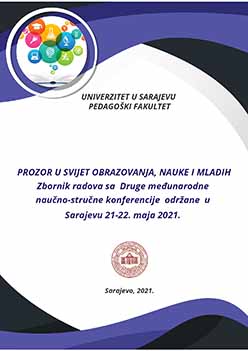STAVOVI UČENIKA O ONLINE NASTAVI U SREDNJOJ ŠKOLI
STUDENTS' ATTITUDES ABOUT ONLINE CLASSES IN HIGH SCHOOL
Author(s): Nermin Mulaosmanović, Hazim Selimović, Zehrina Selimović
Subject(s): School education, Distance learning / e-learning
Published by: UNIVERZITET U SARAJEVU – PEDAGOŠKI FAKULTET
Keywords: attitudes; online classes; high school students;
Summary/Abstract: Due to the pandemic caused by the COVID-19 virus, the educational process has suffered changes that have resulted in school closures, students and teachers were concerned, inability to control the situation, and the transition to online classes. This was the first encounter with online forms of teaching for many, which was a major challenge for students, teachers and parents. Switching to online classes required a certain adaptation. With all this in mind, there are many obstacles and difficulties but also possibilities. Therefore, the primary problem was to test high school students’ attitudes about online teaching while the aim was to determine whether students were satisfied with a number of aspects of online teaching performed in schools such as: readiness for online teaching - using contemporary IKT tools, adoption of knowledge in an online environment, assessment modes, online teaching activity, all in the function of pointing out the benefits and shortcomings of online teaching. The results show that students do not have extremely positive or negative attitudes about online classes, with reference to the scale of attitudes about online classes, students express an average level of satisfaction with online classes, they expressed positive attitudes about evaluation in online classes, and pointed out the satisfaction with activities in the online environment, students said they were prepared for online classes, and that they have received enough knowledge. Considering gender, no significant differences were found in attitudes about online classes, while significant differences were found in the satisfaction for online classes when considering grades. Those who are more satisfied with the knowledge gained are students with better school success. The survey was conducted among 102 adolescents ages 16 to 19 in Tuzla canton area. The scale used was prepared for this research, with satisfactory reliability, and sociodemographic questionnaire. All of this indicates that students quickly adapted to the new changes thanks to the use of IKT tools before the pandemic and their desire for new challenges, those students who achieve good results at school have continued this practice in difficult occasions. In addition to certain negativity, there are also the benefits of this online teaching model.
Book: Prozor u svijet obrazovanja, nauke i mladih
- Page Range: 506-521
- Page Count: 16
- Publication Year: 2021
- Language: Bosnian
- Content File-PDF

